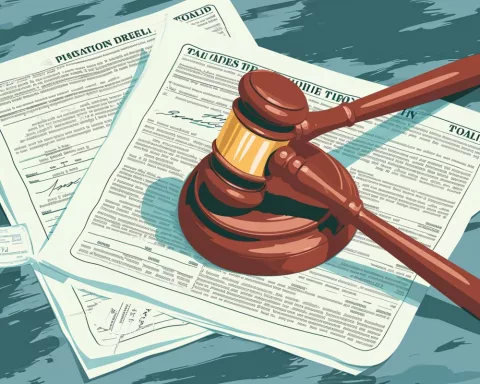Simplifying South Africa’s Revenue Service (SARS) tax system by adopting a flat-rate tax system, similar to Mauritius, could boost compliance rates and tackle tax evasion. This streamlined approach could incentivize high-income taxpayers and small businesses to participate in the formal economy and contribute their fair share to the state’s revenue. While such a strategy may not resolve all issues, implementing a flat tax rate could be a significant step towards an efficient and less complex tax system, contributing to a stronger and more equitable economy.
How could a flat-rate tax system benefit SARS?
Implementing a flat-rate tax system, similar to Mauritius’ model, could potentially demystify SARS’ current complex system and boost compliance rates. This streamlined approach could also tackle tax evasion by incentivizing high-income taxpayers and small businesses to participate in the formal economy. The success of Mauritius’ model proves the viability of such a strategy, but specialized solutions may still be necessary for South Africa’s unique socio-economic landscape. Ultimately, a simplified tax system could contribute to a stronger and more equitable economy.
An Overview of SARS’ Tax System
In our quest to unravel the complexities of South Africa’s Revenue Service (SARS) tax system, Mauritius’s tax model emerges as a paragon of simplicity and effectiveness. It implies that SARS’ adoption of a 23% flat tax rate, not dissimilar to Mauritius’s 15% model, could revolutionize its tax system. This move could demystify the current intricate system and potentially boost compliance rates.
SARS’ current tax system primarily relies on five taxes that jointly generate more than 90% of total tax revenue, as per National Treasury data. Collectively, these taxes constitute R1.52 trillion of the R1.69 trillion tax revenue. The remaining 9.8% of tax revenue (R165 billion) collected in 2023 originates from 20 different taxes, showcasing the excessive complexity of the existing system.
How a Flat-Rate Tax System Could Address Tax Evasion
The recommendation does not solely aim to eliminate complexity. The proposed flat-rate model could potentially tackle one of SARS’ longstanding issues – tax evasion. Over time, the proliferation of multiple taxes and rates has incentivized high-income taxpayers to engage professionals to decrease their tax dues. This practice has resulted in tax law becoming exceedingly complex, with a constant power struggle between SARS and tax practitioners manipulating different loopholes.
This intricate system doesn’t solely impact affluent taxpayers. Small and medium enterprises (SMEs) often feel hampered even before they commence operations due to their tax commitments. This leads many to operate informally, thus contributing zero tax revenue. An uncomplicated, streamlined tax system could potentially incentivize these businesses to participate in the formal economy and contribute their fair share to the state’s revenue.
The Benefits of a Flat-Rate Tax System: The Case Study of Mauritius
Mauritius’ adoption of a flat tax system serves as a beneficial guide. The country implemented a straightforward tax system – a 15% flat tax rate uniformly applied to personal income tax, company profits, and value-added tax (VAT). This strategy resulted in a high compliance rate almost instantaneously, demonstrating the impact of a simplified taxation model.
If SARS were to adopt a comparable approach, replacing all taxes with a 23% flat rate, it could yield an equivalent amount of tax revenue with considerably less complexity. This raises the question: Why not adopt a simpler approach and alleviate the burden for both the taxpayers and the tax collector? The success of the Mauritian model proves the viability of such a strategy.
The Potential Limitations of a Flat-Rate Tax System
Undeniably, the transition to a 23% flat tax rate will not resolve all issues. Certain problems, inherent to South Africa’s unique socio-economic landscape, may necessitate specialized and targeted solutions. Regardless, implementing a flat tax rate could be a significant step towards an efficient and less complex tax system.
The Purpose of Taxation and the Role of a Flat-Rate Tax System
Ultimately, taxation isn’t just about generating revenue. It’s about nurturing an environment conducive to business growth, where SMEs aren’t burdened by excessive obligations, and where all citizens feel they are contributing equitably to the nation’s wealth. A simplified tax system, like the flat tax rate, could be a step towards this goal, contributing to a stronger and more equitable economy.
What is the current state of SARS’ tax system?
SARS’ tax system is overly complex, with five primary taxes generating over 90% of total tax revenue and an additional 20 taxes contributing only 9.8% of revenue. This complexity has led to tax evasion and difficulties for small and medium enterprises.
How could a flat-rate tax system benefit SARS?
Implementing a flat-rate tax system, similar to Mauritius’ model, could potentially demystify SARS’ current complex system and boost compliance rates. This streamlined approach could also tackle tax evasion by incentivizing high-income taxpayers and small businesses to participate in the formal economy. The success of Mauritius’ model proves the viability of such a strategy.
How has Mauritius’ flat tax model worked?
Mauritius implemented a 15% flat tax rate applied to personal income tax, company profits, and value-added tax. This resulted in a high compliance rate almost immediately, demonstrating the impact of a simplified taxation model.
What are the potential limitations of a flat-rate tax system?
While a flat-rate tax system could simplify SARS’ current complex system, certain problems unique to South Africa’s socio-economic landscape may necessitate specialized and targeted solutions in addition to the flat tax rate.
What is the purpose of taxation, and how can a flat-rate tax system contribute to it?
Taxation is about more than generating revenue; it’s about creating an environment conducive to business growth and equitable contributions to the nation’s wealth. A simplified tax system, such as a flat-rate tax, could contribute to a stronger and more equitable economy.
How can a flat-rate tax system address tax evasion?
The proliferation of multiple taxes and rates has incentivized high-income taxpayers to engage professionals to decrease their tax dues. A simplified tax system, like a flat-rate tax, could potentially tackle tax evasion by incentivizing these taxpayers and small businesses to participate in the formal economy and contribute their fair share to the state’s revenue.










